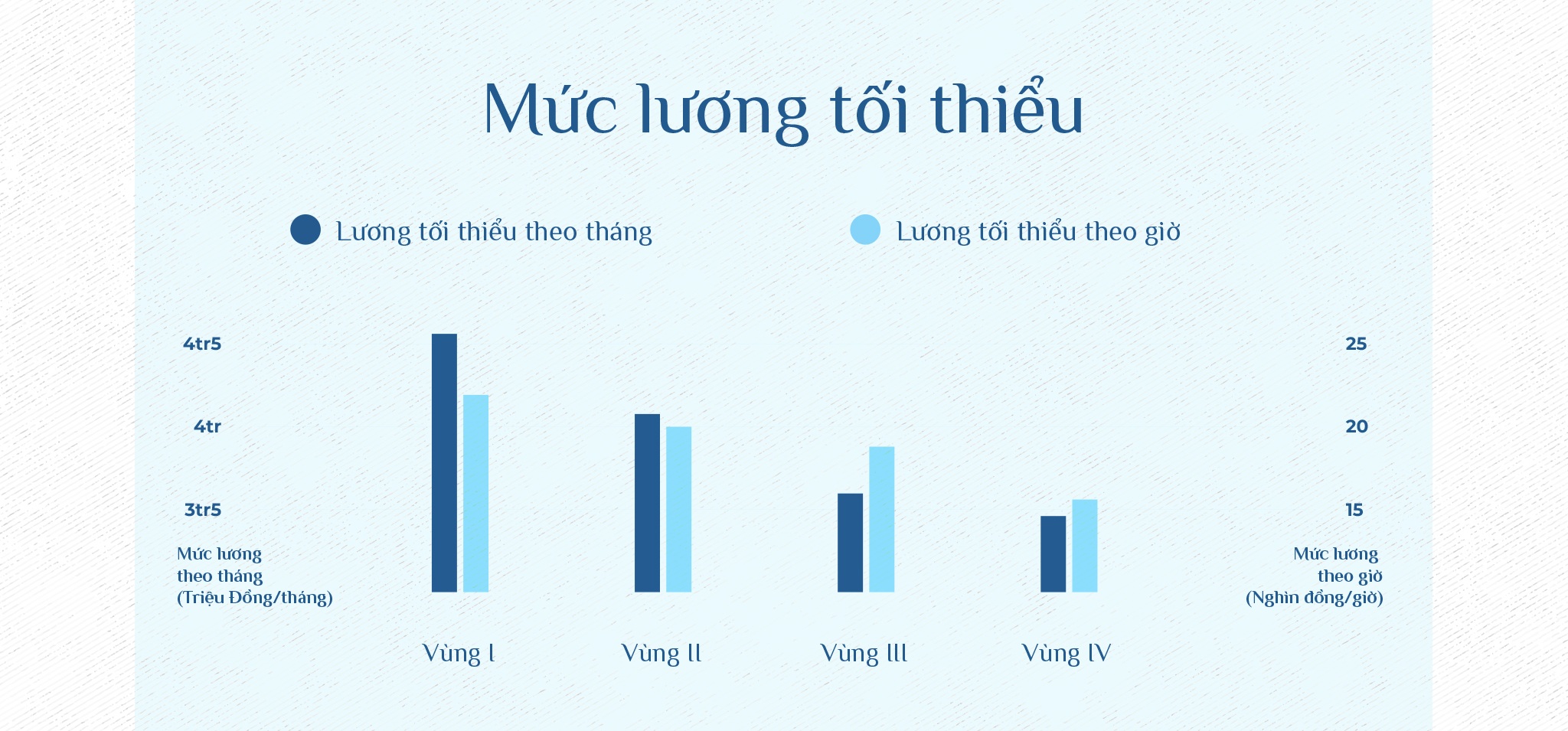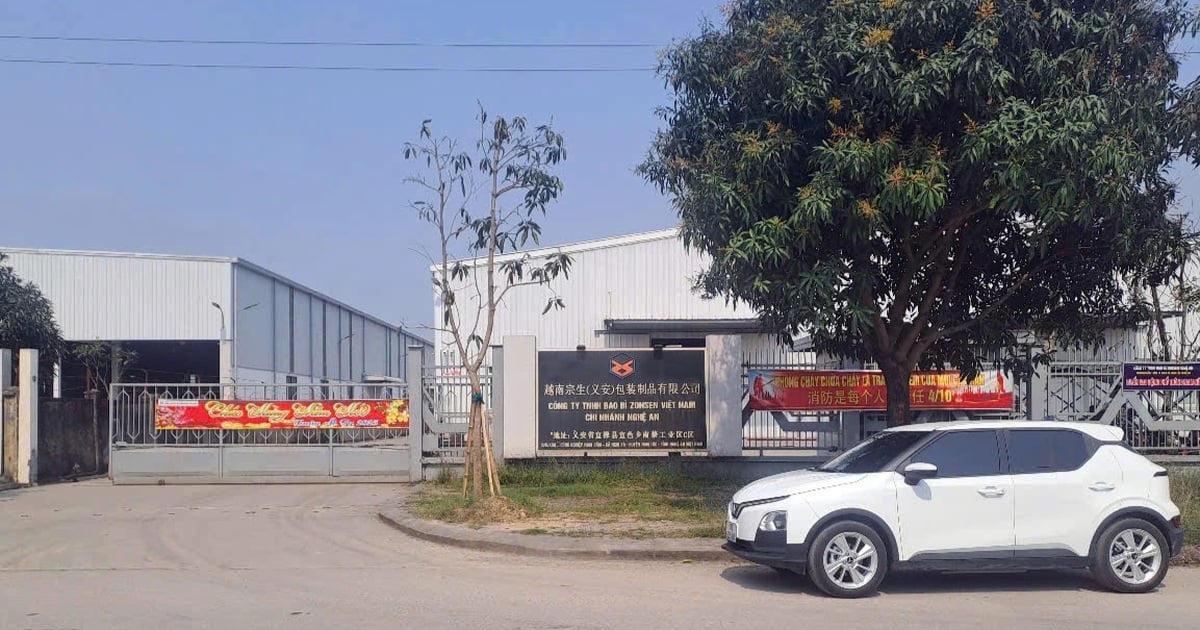In the context of workers losing their jobs and having their income reduced due to lack of orders from businesses, having to reduce production, and making life more difficult, the 2024 regional minimum wage adjustment needs to be carefully considered and calculated.

After some rough calculations, Ms. Dang Thi Nam (30 years old, from Thanh Hoa) said that she had more than 10 years of experience as a worker at Thang Long Industrial Park (Dong Anh, Hanoi). At that time, she was new to the job, fumbling with how to use the machines, and at the end of the month, she took home a salary of only 2 million VND.
The minimum wage has been adjusted over the years, and Ms. Nam's total income has gradually improved compared to before. Currently, her basic salary is 6.5 million VND/month (higher than the current minimum wage in Region I). If she works hard and works overtime, earning more than 10 million VND is possible.
Many of her plans and projects were almost "bankrupt" when the wave of job cuts shook the labor market. In October 2022, Ms. Nam had 2 months of forced leave when the company lacked orders. Although she was out of work, the company still supported workers like her with 70% of her basic salary.

As 2022 comes to an end, difficulties will continue to surround 2023. Ms. Nam said that the company she works for has 2 factories located in the industrial park, and one factory had to lay off half of its workers without pay. Due to her many years of experience, Ms. Nam is one of the lucky workers who was able to retain and maintain her job.
However, last June she also took 20 days off work. Having just returned to the factory from her hometown, this female worker's biggest wish is for the company to have many orders and for employees to have regular work documents.
"Honestly, everyone wants a raise, but at this time, having a job is better," Ms. Nam confided.
Understanding the thoughts and aspirations of workers, Chairman of the Hanoi Textile and Garment Trade Union Hoang Thanh Son said that workers always want to increase their salaries and improve their income. However, this also needs to be considered, based on the socio-economic situation this year to calculate the salary adjustment level suitable for the "health" of the enterprise.
Many export businesses lack orders, including the textile industry.
In fact, 50% of the industry's workers in the capital have had their jobs affected.

"If we lay off workers, when the economy recovers, it will be very difficult for businesses to recruit. If we try to maintain them, we will have to bear the pressure of increasing wages. Businesses cannot handle it, forcing these units to consider a temporary solution of reducing work to reduce labor costs," said Mr. Son.
Therefore, the union representative commented that this year, keeping workers' jobs is difficult, let alone increasing wages.
Vice President of the Vietnam General Confederation of Labor Ngo Duy Hieu said that recently, the Confederation has surveyed the lives, needs, and aspirations of workers. Thereby, it has been noted that the vast majority of workers want to increase the minimum wage because their real life is facing many difficulties.
Regarding the proposed salary increase, the Vice Chairman of the National Wage Council said that the specific increase will be negotiated and discussed in the upcoming council meeting.
"We understand and share with businesses and we believe that businesses also share and understand with workers, to have a common voice, to propose appropriate and specific salary increases in the current context," said Mr. Hieu.

"The regional minimum wage should not be adjusted," Mr. Ngo Minh Hoan, CEO of Hung Long Garment and Service Joint Stock Company (Hung Yen) asserted.
Since the beginning of the year, the export market in the garment sector has not been optimistic. This is causing difficulties and challenges for businesses. Mr. Hoan predicts that at least by the end of this year, the production and business situation of the unit can recover.

(Current monthly minimum wage: Region I: 4,680,000 VND; Region II: 4,160,000 VND; Region III: 3,640,000 VND; Region 4: 3,250,000 VND.
Minimum hourly wage: Region I: 22,500 VND; Region II: 20,000 VND; Region III: 17,500 VND; Region 4 is 15,600 VND)
Currently, not including the Tet bonus, the income of the company's workers is about 8,500,000 VND/month. This level is much higher than the regional minimum wage. However, increasing the regional minimum wage will increase the cost of social insurance, union fees, etc. In the long term, this increase is beneficial for workers. However, in the current difficult situation, it is also a factor that creates significant challenges.
"For businesses that are struggling, increasing salary costs at this time is creating a disadvantage in price competition," said Mr. Hoan.
Speaking to the press, Mr. Hoang Quang Phong, Vice President of the Vietnam Federation of Commerce and Industry (VCCI), said that the fact that businesses can maintain the current salary level is a great effort. Adjusting the minimum wage at this time will make it even more difficult for employers.

According to the Vice President of VCCI, more difficulties for businesses mean more uncertainty for workers. Businesses will have to adjust, even cut jobs, and let workers take turns off.
"From there, we unintentionally push a part of the employed workers to become unemployed, which means losing or reducing income, making it difficult to ensure life. That is something no one wants," the Vice President of VCCI analyzed.
The Vice President of VCCI also informed that the National Wage Council will soon meet, discuss details and make specific recommendations to have appropriate policies to reduce difficulties for businesses as well as workers.
Commenting on the regional minimum wage for 2024, the former Chairman of the National Wage Council said that it is forecasted that the labor market will not fully recover until the end of 2024, so businesses need to be stable during this time.

Former Deputy Minister of Labor, Invalids and Social Affairs Pham Minh Huan said that the regional minimum wage increase of 5-6% is appropriate to the capacity of businesses.
"However, the important factor to consider is whether the economy and labor market will recover or not. This is the decisive factor in adjusting wages. If the situation worsens, the state will be forced to maintain stability for enterprises' production and business activities," Mr. Huan said.
Ms. Nguyen Thi Lan Huong, former Director of the Institute of Science - Labor and Social Affairs, expressed her opinion that this year the minimum wage should not be adjusted for 2024.
Because the labor market is still very volatile. On the other hand, the minimum wage needs to be expanded in scope to be valuable. Because the minimum wage is just the foundation, the final safety net. The actual income of workers must always "perform" above that net.

Discussing this issue, Mr. Pham Trong Nghia, a member of the National Assembly's Social Committee, said that the General Statistics Office announced notable indicators for the first 6 months of the year, such as GDP growth of only 3.72% while the target was 6.5%. Another sign is that the consumer price index has been continuously decreasing over the past 6 months, if it was 5% in January, it was only about 2% in June, demonstrating weak purchasing power.
The production and business situation is affected by global trade because of the large openness of the Vietnamese economy. According to Mr. Nghia, the Government's report shows that in the first 3 months of the year, both exports and imports decreased.
This proves that domestic enterprises face many difficulties, it is difficult to find orders, many enterprises reduce working hours, the number of unemployed workers increases.

"Such economic context and macroeconomic indicators pose a very challenging problem for adjusting regional minimum wages. The most recent wage increase is from January 1, 2022 with an increase of 6%, at the same time the state determines the hourly minimum wage," said Mr. Nghia.
Mr. Nghia said that the National Wage Council needs to negotiate soon, because the sessions may last long. The delegate's point of view is to support the policy of increasing wages for workers.
Compared to the average of other countries in the region, Vietnam's regional minimum wage is still low. Expressing the view that we should not continue to compete for cheap labor, Mr. Nghia said that by increasing wages, investors will adjust their investment policies to valuable industries, improving labor productivity.
Source link


![[Photo] Closing of the 4th Summit of the Partnership for Green Growth and the Global Goals](https://vstatic.vietnam.vn/vietnam/resource/IMAGE/2025/4/17/c0a0df9852c84e58be0a8b939189c85a)
![[Photo] National Assembly Chairman Tran Thanh Man meets with outstanding workers in the oil and gas industry](https://vstatic.vietnam.vn/vietnam/resource/IMAGE/2025/4/17/1d0de4026b75434ab34279624db7ee4a)
![[Photo] Air Force practices raising flag in Ho Chi Minh City sky in preparation for April 30th holiday](https://vstatic.vietnam.vn/vietnam/resource/IMAGE/2025/4/18/de7139d9965b44f8ac1f69c4981196fd)
![[Photo] General Secretary To Lam receives CEO of Warburg Pincus Investment Fund (USA)](https://vstatic.vietnam.vn/vietnam/resource/IMAGE/2025/4/18/7cf9375299164ea1a7ee9dcb4b04166a)
![[Photo] The beauty of Ho Chi Minh City - a modern "super city" after 50 years of liberation](https://vstatic.vietnam.vn/vietnam/resource/IMAGE/2025/4/18/81f27acd8889496990ec53efad1c5399)



























![[Photo] Nhan Dan Newspaper announces the project "Love Vietnam so much"](https://vstatic.vietnam.vn/vietnam/resource/IMAGE/2025/4/17/362f882012d3432783fc92fab1b3e980)































































Comment (0)